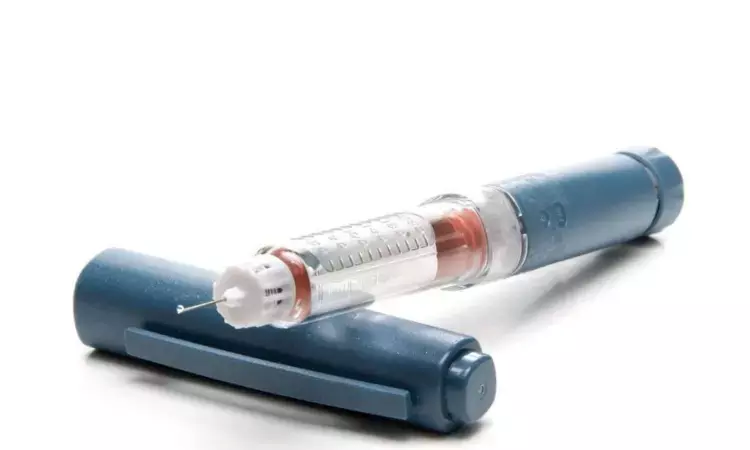- Home
- Medical news & Guidelines
- Anesthesiology
- Cardiology and CTVS
- Critical Care
- Dentistry
- Dermatology
- Diabetes and Endocrinology
- ENT
- Gastroenterology
- Medicine
- Nephrology
- Neurology
- Obstretics-Gynaecology
- Oncology
- Ophthalmology
- Orthopaedics
- Pediatrics-Neonatology
- Psychiatry
- Pulmonology
- Radiology
- Surgery
- Urology
- Laboratory Medicine
- Diet
- Nursing
- Paramedical
- Physiotherapy
- Health news
- Fact Check
- Bone Health Fact Check
- Brain Health Fact Check
- Cancer Related Fact Check
- Child Care Fact Check
- Dental and oral health fact check
- Diabetes and metabolic health fact check
- Diet and Nutrition Fact Check
- Eye and ENT Care Fact Check
- Fitness fact check
- Gut health fact check
- Heart health fact check
- Kidney health fact check
- Medical education fact check
- Men's health fact check
- Respiratory fact check
- Skin and hair care fact check
- Vaccine and Immunization fact check
- Women's health fact check
- AYUSH
- State News
- Andaman and Nicobar Islands
- Andhra Pradesh
- Arunachal Pradesh
- Assam
- Bihar
- Chandigarh
- Chattisgarh
- Dadra and Nagar Haveli
- Daman and Diu
- Delhi
- Goa
- Gujarat
- Haryana
- Himachal Pradesh
- Jammu & Kashmir
- Jharkhand
- Karnataka
- Kerala
- Ladakh
- Lakshadweep
- Madhya Pradesh
- Maharashtra
- Manipur
- Meghalaya
- Mizoram
- Nagaland
- Odisha
- Puducherry
- Punjab
- Rajasthan
- Sikkim
- Tamil Nadu
- Telangana
- Tripura
- Uttar Pradesh
- Uttrakhand
- West Bengal
- Medical Education
- Industry
Add on liraglutide to insulin infusion improves blood sugar control in diabetes patient undergoing cardiac surgery

In patients with diabetes mellitus (DM) having cardiac surgery, perioperative hyperglycemia has been a frequent issue, occurring in as many as 40%–60% of cases. Contrary to non-cardiac surgery, cardiopulmonary bypass (CPB)-induced disruption of the glucose metabolism and hypothermia-induced disruption of hormone secretion are the unique reasons of hyperglycemia in cardiac surgery. Both of these events have an impact on the release of the hormone glucagon. The conventional approach for controlling blood glucose (BG) is insulin infusion. It has been shown that BG fluctuation or high glycemic variability (GV) causes greater endothelial damage, morbidity, and death than a constant level of hyperglycemia. Liraglutide, a glucagon-like peptide-1 (GLP-1) receptor agonist, has long been used in outpatient DM settings where it has been shown to be safe and effective in decreasing BG and GV. A recently released research shown that liraglutide combined with insulin infusion may reduce perioperative blood glucose and is advantageous for decreasing both GV and BG in postoperative DM patients.
Patients with DM receiving cardiopulmonary bypass surgery underwent a randomized control study (CPB). Age range of 20–80 years and DM Type 2 were inclusion criteria.
Randomly, Group 1 (added liraglutide with insulin infusion) and Group 2 were chosen for the enrolled patients (insulin infusion). According to institutional procedure, insulin was infused. Insulin dosage modification and blood glucose analysis both utilised glucose from point-of-care testing (POCT). For GV analysis, a continuous glucose meter (CGM) was used (using Standard deviation: SD).
In all, 60 patients participated in our research (32 in Group 1 and 28 in Group 2). Group 1's perioperative mean BG levels were 15.9 mg/dL lower on average than Group 2's during the procedure. Nine patients had BGs between 60 and 70 with mean BGs (109.1 vs. 147.9, P = 0.001) in the morning (18.7% vs. 10.7%, P = 0.384). At the first hour after surgery, there were 13 patients (9.4% vs 35.7%, P = 0.025) with BG >180 mg/dL. SDs were rising, however throughout the postoperative phase, Group 1's SD was lower. At postoperative day 2, the mean SDs were 23.65 vs. 32.79 mg/dL, P = 0.018.
Liraglutide is a human glucagon-like peptide-1 (GLP-1) analog that has been acylated. GLP-1 agonists work primarily by boosting glucose absorption and glycogen synthesis while suppressing glucagon secretion and enhancing insulin secretion. Liraglutide is excellent for once-daily dosage since it is slowly absorbed after subcutaneous injection, strongly binds to serum albumin, and has a slow rate of excretion. Liraglutide may reduce perioperative blood glucose levels and is advantageous for DM patients in that it lowers GV as well as BG throughout the surgical phase.
In the morning, before to CPB, and during the whole perioperative period, we showed a significantly lower BG in the liraglutide-added group compared to the no-liraglutide group. Using 0.6 mg of liraglutide subcutaneously in the evening of the day before surgery and 1.2 mg after induction of anesthesia, the findings revealed the efficiency of liraglutide in decreasing blood sugar (mean difference = 0.66 mmol/L). Therefore, it is reasonable to assume that liraglutide may be utilized as an adjunctive therapy to reduce BG in DM patients prior to heart surgery. Liraglutide can be used during heart surgery, however a change in timing and dose needs further research.
Reference –
Sindhvananda W, Poopuangpairoj W, Jaiprasat T, Ongcharit P. Comparison of glucose control by added liraglutide to only insulin infusion in diabetic patient undergoing cardiac surgery: A preliminary randomized-controlled trial. Ann Card Anaesth 2023;26:63-71
MBBS, MD (Anaesthesiology), FNB (Cardiac Anaesthesiology)
Dr Monish Raut is a practicing Cardiac Anesthesiologist. He completed his MBBS at Government Medical College, Nagpur, and pursued his MD in Anesthesiology at BJ Medical College, Pune. Further specializing in Cardiac Anesthesiology, Dr Raut earned his FNB in Cardiac Anesthesiology from Sir Ganga Ram Hospital, Delhi.
Dr Kamal Kant Kohli-MBBS, DTCD- a chest specialist with more than 30 years of practice and a flair for writing clinical articles, Dr Kamal Kant Kohli joined Medical Dialogues as a Chief Editor of Medical News. Besides writing articles, as an editor, he proofreads and verifies all the medical content published on Medical Dialogues including those coming from journals, studies,medical conferences,guidelines etc. Email: drkohli@medicaldialogues.in. Contact no. 011-43720751


